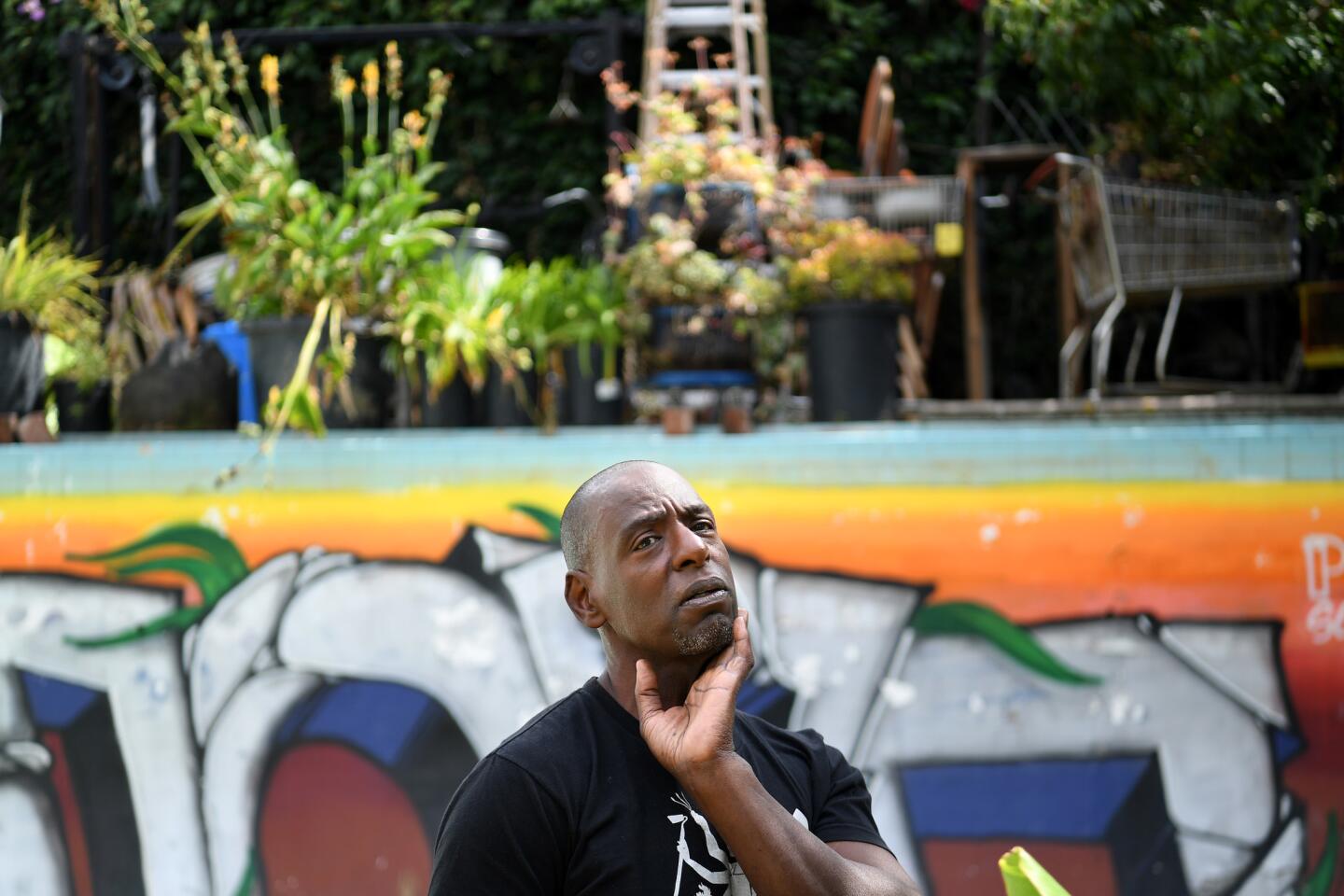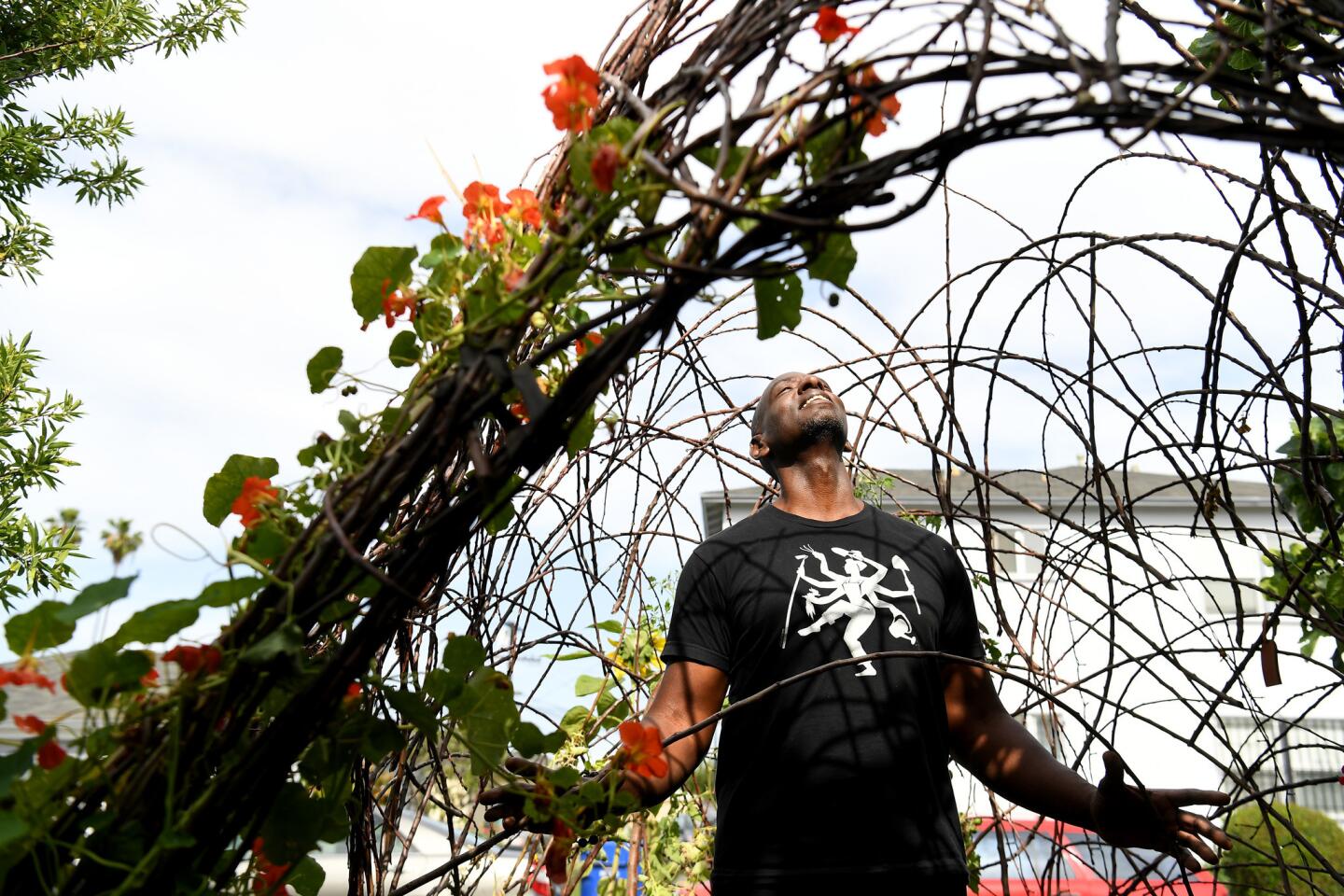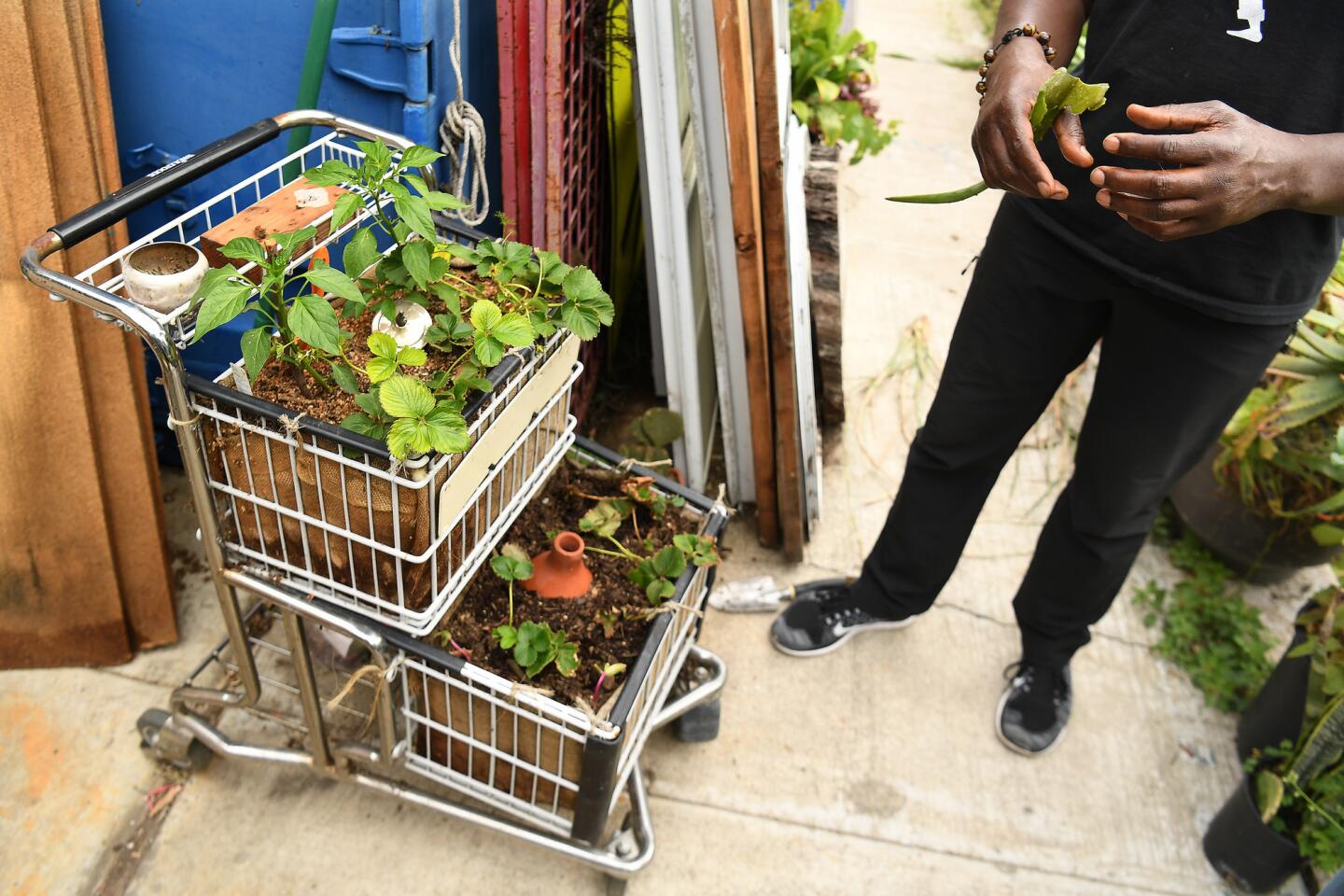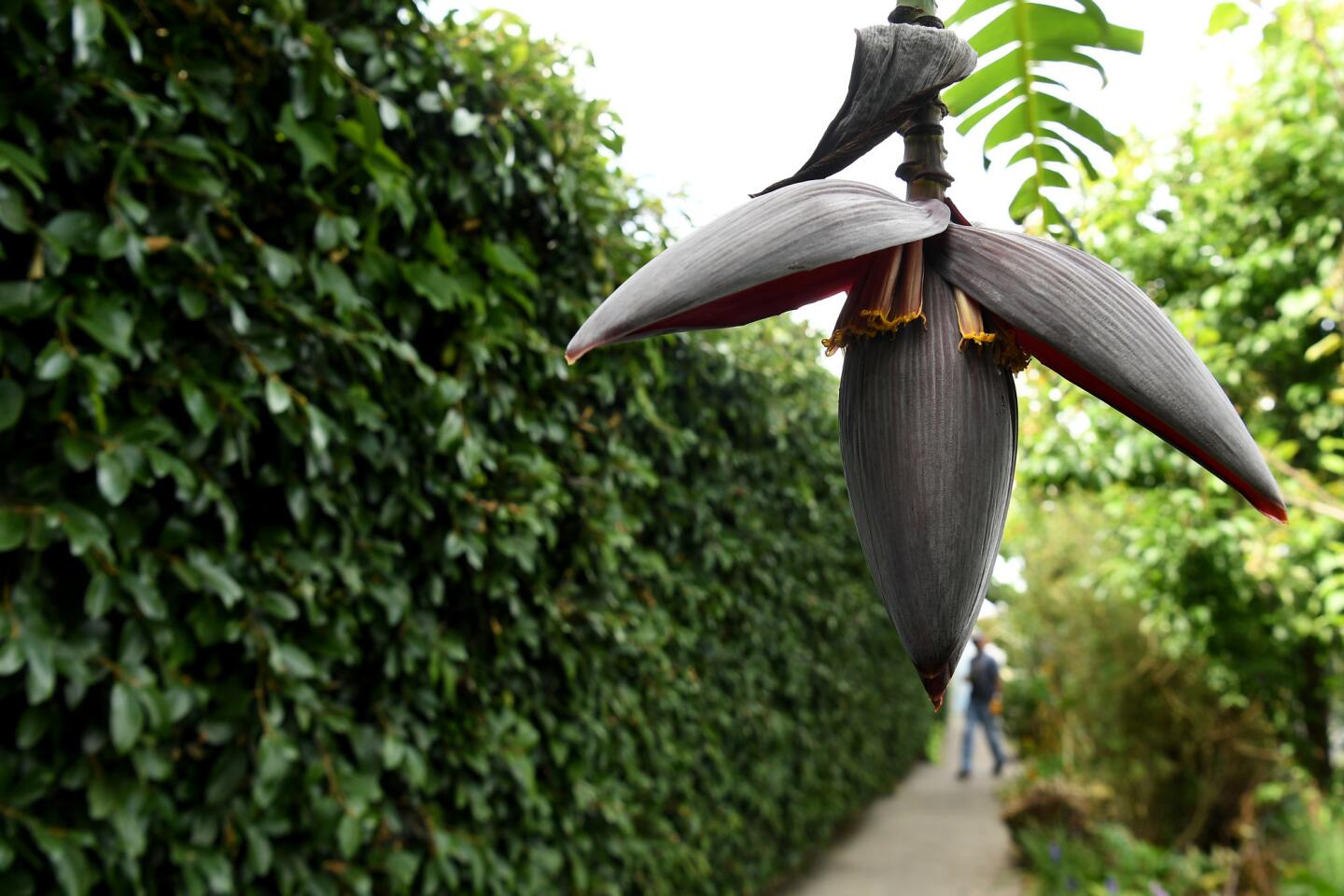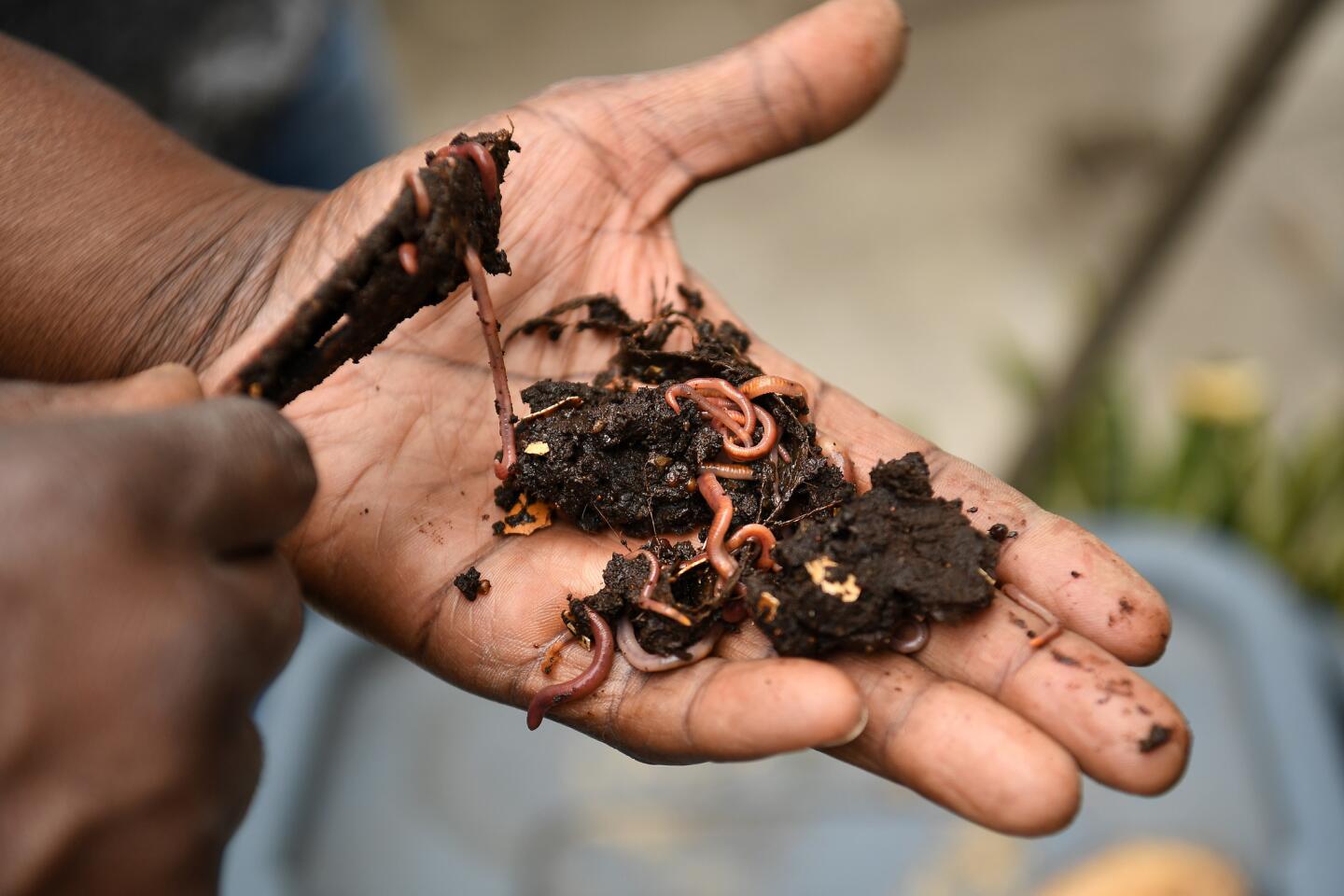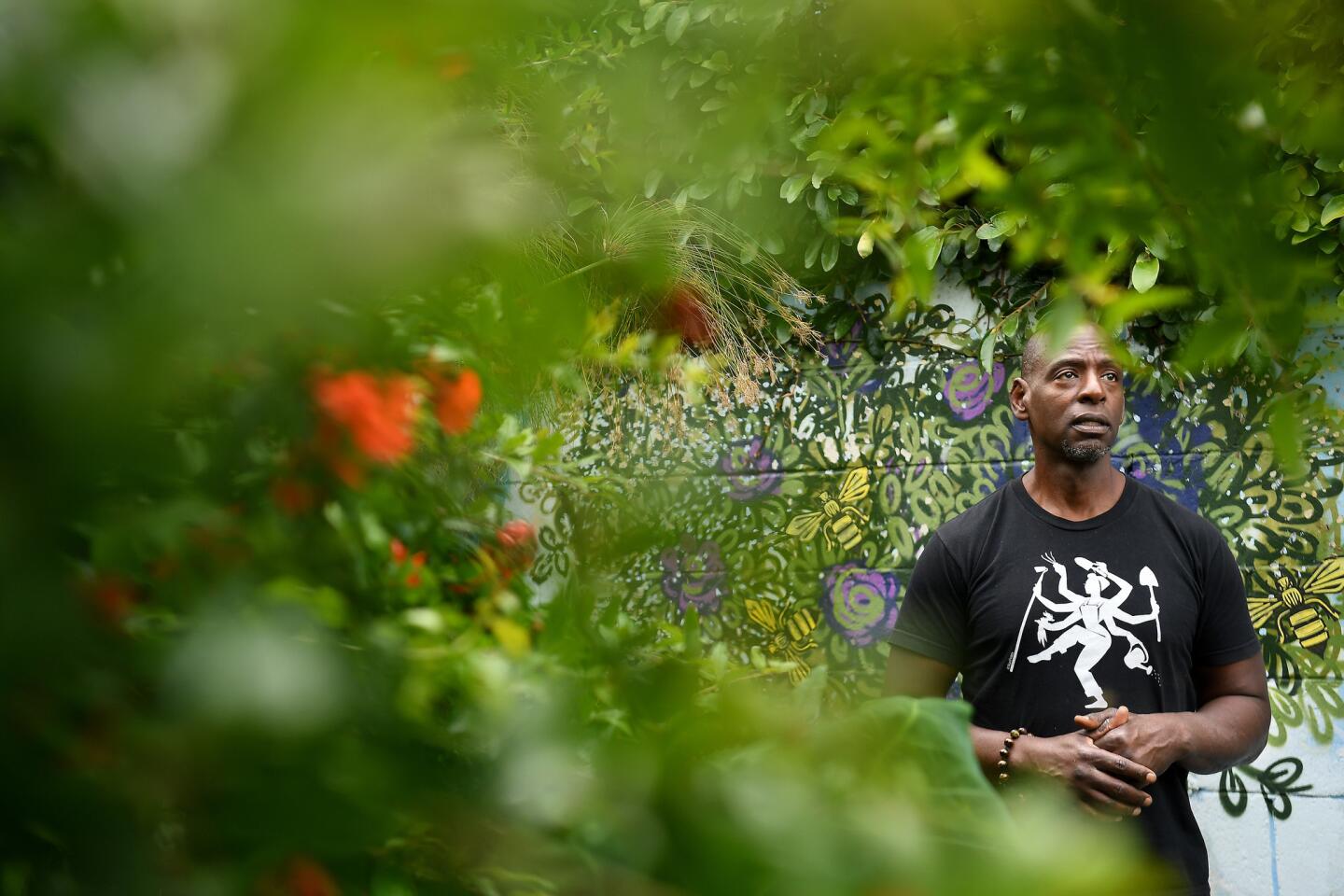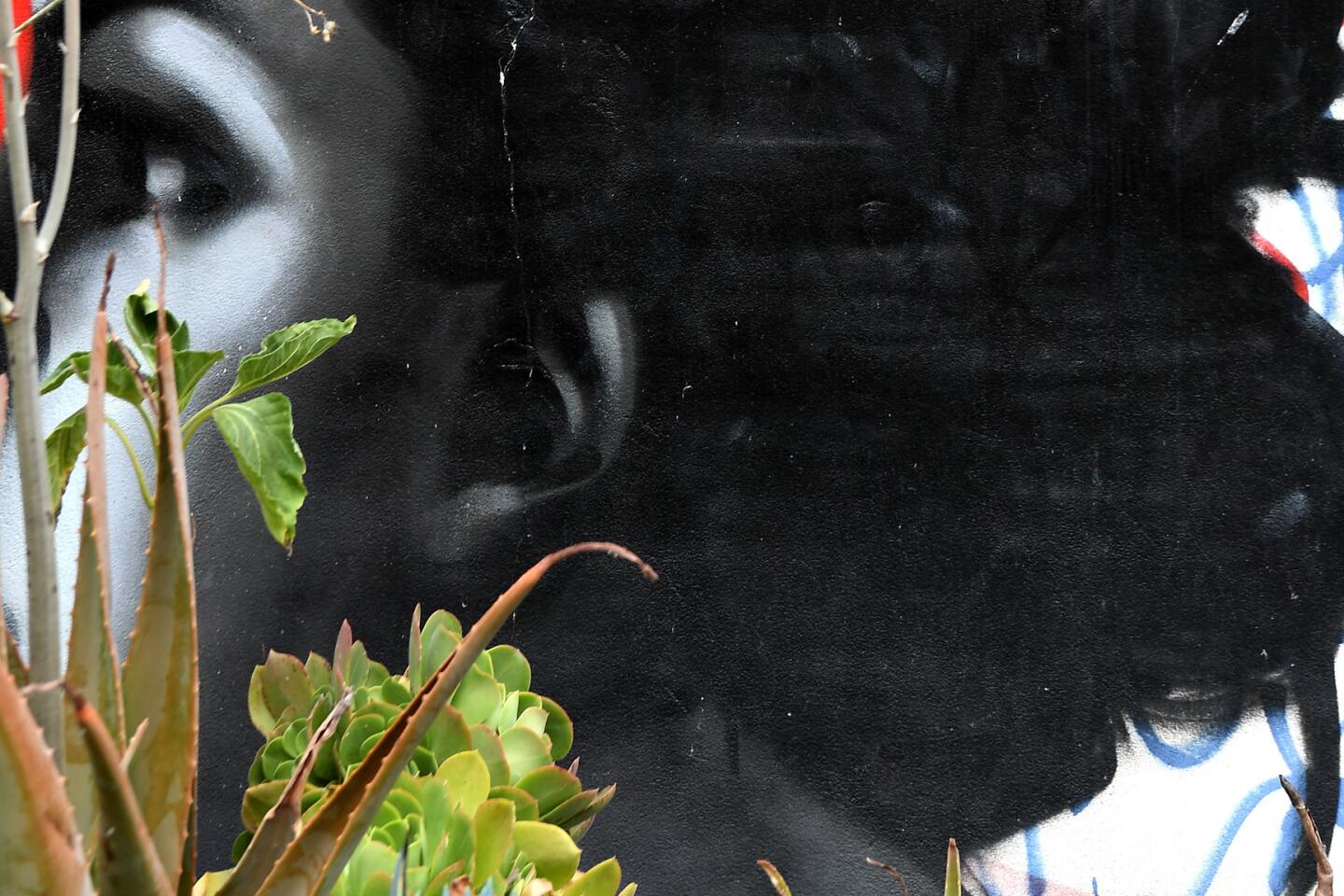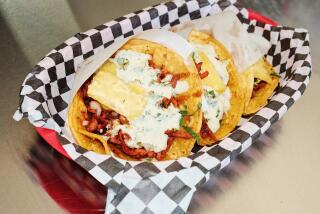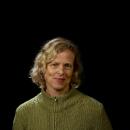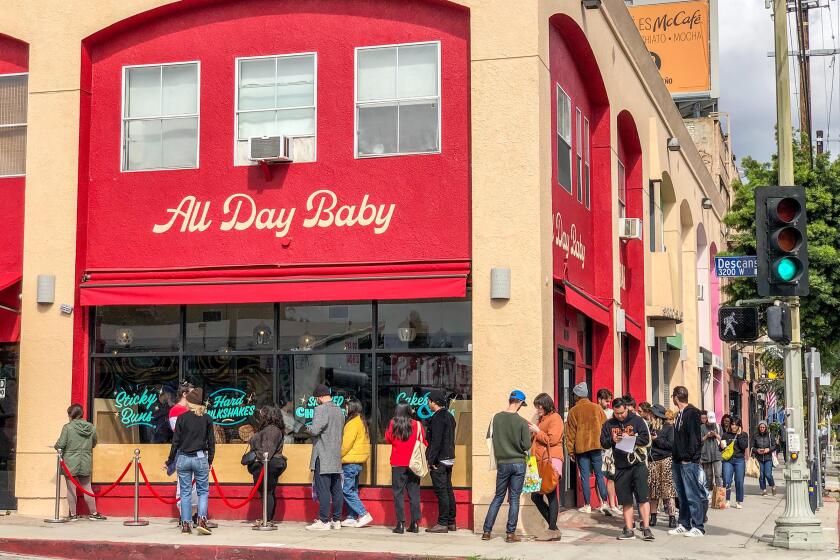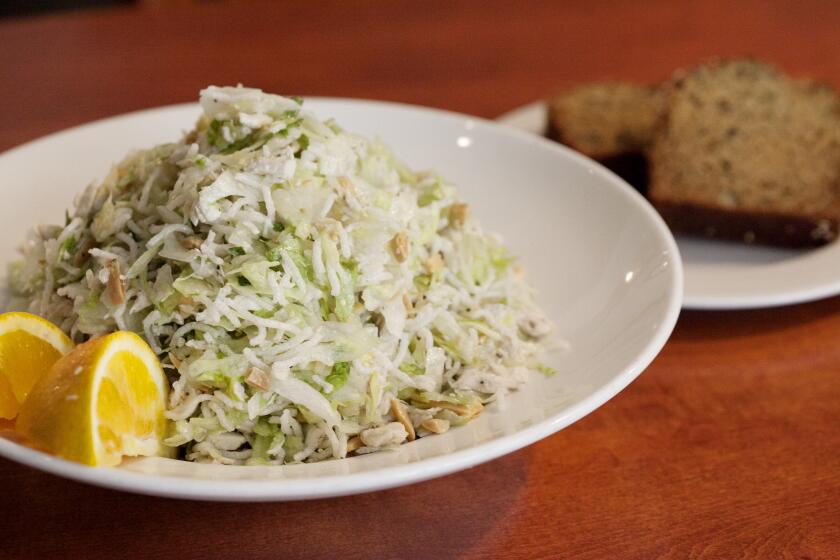In the dirt with Ron Finley, the Gangsta Gardener
Ron Finley is standing in the deep end of an Olympic-sized swimming pool. The pool is empty, has been empty for years, the water long ago replaced by an elaborate garden. The garden overflows the geometry of the pool, growing up the sides, in and out of buckets and boxes and pails, around brightly painted artwork and a mural painted by one of Finley’s three grown sons, two of whom are artists. Above the pool there’s a network of more buckets, shopping carts planted with strawberries, a system of compost bins, beds of kale and oxalis, a nectarine tree growing in a layer of 18 inches of soil above concrete. Butterflies and hummingbirds dart through a pomegranate tree. If you didn’t know it, you’d think you were somewhere in the tropics, someplace like Macondo, Gabriel Garcia Marquez’s imaginary, lush, butterfly-filled town — not in South Los Angeles where Finley grew up and lives, a few hundred yards from the Farmdale Expo station.
“This is definitely a lemonade story,” says Finley, as he weeds a bucket of chard. Wild amaranth grows up between cracks in the concrete at his feet.
If you’ve heard of Ron Finley, it might be because you’re one of the almost 3 million people who’ve watched his 2013 TED talk about guerrilla gardening in South Los Angeles. Or because you read the 2011 Steve Lopez column in this newspaper, about Finley’s original efforts to plant an edible garden in the 150-by-10-foot median strip parkway in front of his house — a project for which he was fined and, when he refused to pay, an arrest warrant was issued.
Finley had success in his first career, as a designer whose clothes were in Nordstrom, Neiman Marcus and Saks. But after the recession hit, he was out of work when he took a gardening class and decided to grow the vegetables he got tired of driving 45 minutes outside of his neighborhood to find. When he was told not to, he got motivated. And soon the Gangsta Gardener grew, along with the garden in that median strip and the larger one inside his pool. Soon Finley turned his garden into the Ron Finley Project, and that project into a mission: to bring urban gardening not only to South L.A. but to the world.
“People underestimate you,” says Finley now, picking a handful of blueberries. “You can use that to your advantage.”
Finley was in the news again in November, when his backyard garden and adjacent house, which he’s rented and lived in for years and where he now runs the nonprofit Ron Finley Project, was bought at a foreclosure auction by a real estate development company. Finley refused to leave and instead launched a change.org petition and a Gofundme page, which drew support from major sponsors and companies such as Nell Newman, Annie’s Homegrown (whose President John Foraker personally donated $50,000), Applegate Farms, Dr. Bronner’s, Patagonia, Bette Midler and Califia Farms. A few weeks ago, the Ron Finley Project bought the property.
“It’s done. I got the paperwork,” says Finley, his expression a combination of satisfaction, relief and exhaustion. “John told me, ‘This is for what you’ve already done. Don’t think you have to gear up and do anything else. Just live the life you want to live.’ It’s so funny to have other people telling you the … you tell them. I say that; you don’t say that to me.” He’s smiling now, as he walks across the sidewalk to the median strip that started it all.
This is definitely a lemonade story.
— Ron Finley
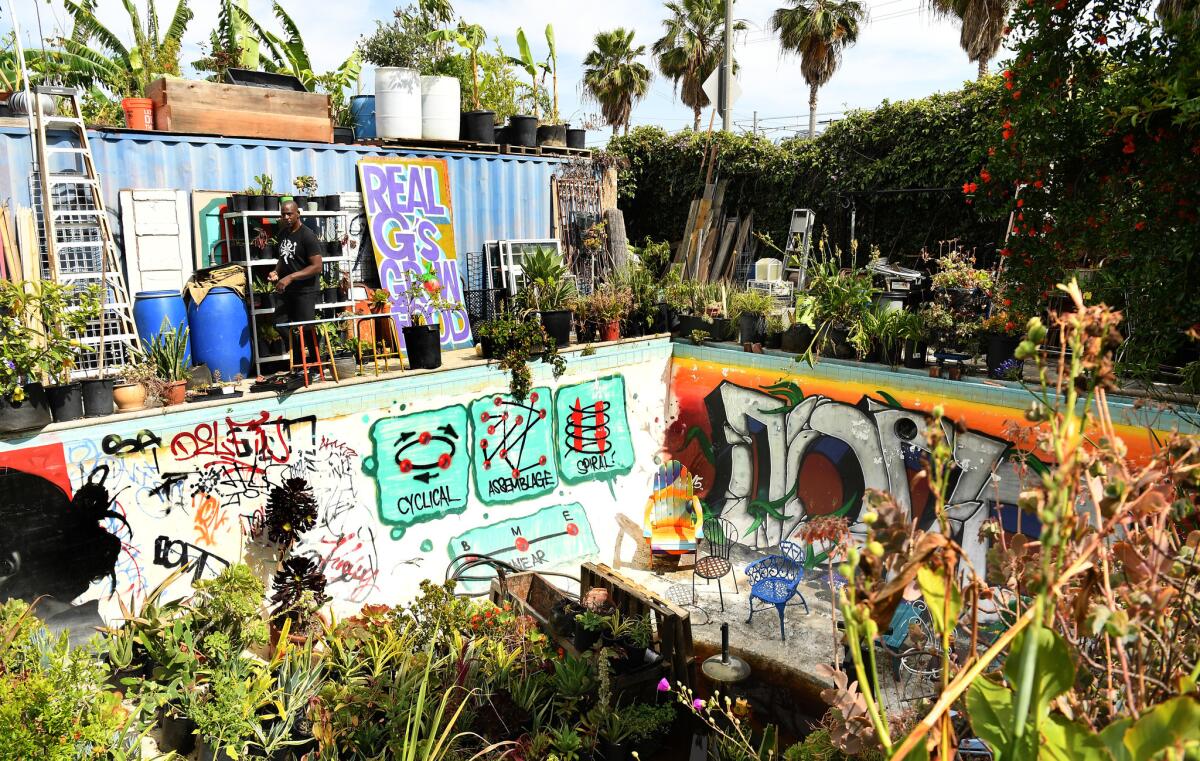
Finley’s parkway garden catalog goes like this: a Valencia orange tree, a pear tree, a pomegranate tree, papyrus, sugar cane, an almond tree, rosemary, artichokes, chard, flowering celery, Mexican marigolds, Red Russian kale, mint, sweet potato vines, blackberries, fennel, a Santa Rosa plum tree, a banana tree, Christmas Lima beans, sunflowers, volunteer Green Zebra tomatoes, an apple tree, red dandelions, corn, nasturtiums, an apricot tree. Embedded among the greenery is a tent woven from branches, which is where Finley is now sitting, on a tree stump. It’s a lot of food, but Finley says he grows mostly for himself and his family, friends and neighbors, as well as for groups who visit the garden, either by appointment or accident.
“I come out here in the middle of the night and there are people sitting here,” he says of passersby who find solace, maybe a snack, in the garden, as a train roars past. You can’t see the train through Finley’s trees, but you can hear it, and the traffic on Exposition Boulevard, and the occasional helicopter. The demographics of exactly where Finley is sitting now are as important to him as they’ve always been. “I can get alcohol faster than I can get an organic banana,” Finley says of the South L.A. (it was renamed, from South Central, in 2003) neighborhood where he grew up. “Why are these communities of color designed like that? Some places, you can be at a dialysis center and look down the street and see another dialysis center. You can’t tell me that’s not by design. Why aren’t you telling me how to get healthy? It’s so much bigger than the food.”
I can get alcohol faster than I can get an organic banana. Why are these communities of color designed like that?
— Ron Finley
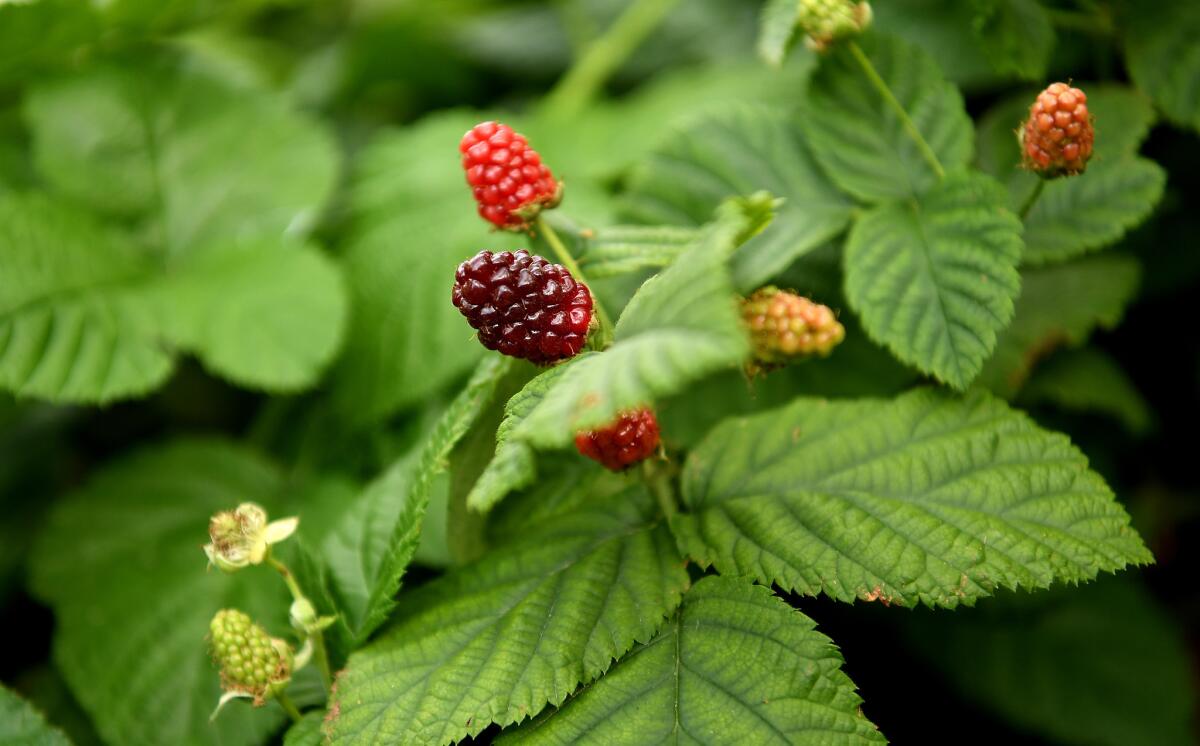
But Finley’s most recent fight has only, he says, made him stronger.
“It’s been interesting. It continues to be very interesting,” he says. An older Hispanic man pulls up and idles his truck next to the Green Zebra plants. Finley and the man discuss tomatoes in a mixture of English and Spanish, and Finley tells him they’re not ripe yet, that he’ll give him some seeds.
“People ask me what my inspiration is, and I tell them: I woke up this morning,” Finley says, smiling again. “It kinda ain’t about food; it’s about food justice. If you aren’t eating healthy, nutritious, vibrant food, how’s anything in you gonna grow?”
On May 27 at noon as part of Food Bowl, the Ron Finley Project will host a pop-up taco garden bar with ingredients sourced from the garden, 4501 Exposition Blvd., Los Angeles. And on June 24, from 10 a.m. to 5 p.m., it’ll host the third annual Da Function, a free event with a garden installation, yoga, storytelling and food trucks, at Vermont Square Library, 1201 W. 48th St., Los Angeles.
ALSO:
What does it mean to be a chef in Los Angeles in 2017?
In Watts, foodie haven Locol cooks up a healthier lifestyle — and a new outlook
More to Read
Eat your way across L.A.
Get our weekly Tasting Notes newsletter for reviews, news and more.
You may occasionally receive promotional content from the Los Angeles Times.
